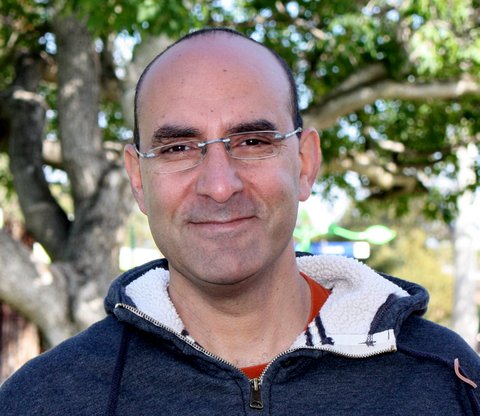I recently spent a few days with my family at a ski lodge in the Sierras. While we were there, we noticed a young French couple who spent the vast majority of their time sitting by the fire, staring at a tiny Android tablet, flipping through a guidebook, and making notes in a paper calendar. For two or three days, while we were out skiing through the sublimely silent woods, learning how to snowboard on the bunny slope, and sitting in the hot tub underneath the misty evening skies, these two sad, beautiful foreigners were sitting in the lodge, trying to plan their trip.
[aditude-amp id="flyingcarpet" targeting='{"env":"staging","page_type":"article","post_id":417889,"post_type":"story","post_chan":"none","tags":null,"ai":false,"category":"none","all_categories":"business,","session":"B"}']A similar experience motivated Travis Katz to create Gogobot, a social travel recommendation engine that helps you plan your trip quickly and efficiently by using the expertise of your Facebook and Twitter networks. Katz, while working for MySpace in London a few years ago, spent so much time researching and planning European trips that he wound up missing many of the actual trips.
Gogobot now has 160,000 daily average users who use it to plan trips to more than 60,000 destinations. About half of them use the company’s mobile app (recently launched on iOS), and 91 percent log in with their real names, using their Facebook identities.
AI Weekly
The must-read newsletter for AI and Big Data industry written by Khari Johnson, Kyle Wiggers, and Seth Colaner.
Included with VentureBeat Insider and VentureBeat VIP memberships.
To take the company to the next level, Gogobot recently hired former SRI senior scientist, Osher Yadgar, who helped work on virtual personal assistant technology related to Siri, the voice- and artificial intelligence-powered assistant now built into the iPhone 4S. Yadgar will help Gogobot use artificial intelligence to plan your trips.
“When you plan a trip, it’s a huge problem,” Yadgar said in an interview with VentureBeat. “It’s a no-fun task for something that is supposed to be a fun activity.”
“One major problem is you have a lot of information available to you,” Yadgar continued. “Another problem is that the information is biased. You have many people trying to sell you something, and the recommendations they give you, they’re giving to everyone the same way.”
As an alternative to one-size-fits-all sales pitches, Yadgar plans to use artificial intelligence to personalize and refine Gogobot’s travel recommendations for each customer.
A word he kept repeating during our conversation was “trust.” In his Ph.D. thesis research, Yadgar examined ways of synthesizing data from large-scale, multi-sensor networks, so that humans could trust the data they were producing. As a researcher at SRI, Yadgar worked on sensor systems to give soldiers in the field critcial information — another area where humans need to trust the data they’re receiving. Finally, in his work with virtual personal assistants at SRI, Yadgar helped build computer systems that could interact with humans using natural language, through back-and-forth dialogs. That work, Yadgar explained, focused on “understanding dialogs and building trust.” That work built on earlier research done at SRI that led to Siri, which SRI spun off as a separate company and which Apple later acquired.
Of course, you could say that Siri has broken many people’s trust, delivering results that fall far short of what Apple promises in its ads. Some customers have gone so far as to sue Apple for breaking that trust. Perhaps that has more to do with Apple’s breathless marketing than SRI’s underlying technology, however.
[aditude-amp id="medium1" targeting='{"env":"staging","page_type":"article","post_id":417889,"post_type":"story","post_chan":"none","tags":null,"ai":false,"category":"none","all_categories":"business,","session":"B"}']
Back to Gogobot. “What we are trying to do is take into account the magnitude of this information and look at it in a personalized way, and reason about you and your preferences and your social network, and build a trusting mechanism for advice,” Yadgar said.
On Gogobot’s iPhone app, you can browse popular hotels, restaurants, and activities, with all recommendations sorted according to your friends’ reviews. Additionally, Gogobot includes virtual “postcards” for sharing with your friends via Facebook, Twitter, SMS, or email.
The company started in Katz’s garage. He and cofounder Ori Zaltzman eventually moved to an office in Menlo Park. In November 2010, they launched Gogobot and won a Crunchie for Best Design that year, beating AirBNB and Flipboard for the honor.
The company has raised a total of $19 million from Redpoint Ventures, Battery Ventures, Innovation Endeavors, Crunchfund, MySpace founder Chris DeWolfe, Square chief operating officer Keith Rabois, and Oren Ze’ev. The most recent round, in November, 2011, was for $15 million and was led by Redpoint.
[aditude-amp id="medium2" targeting='{"env":"staging","page_type":"article","post_id":417889,"post_type":"story","post_chan":"none","tags":null,"ai":false,"category":"none","all_categories":"business,","session":"B"}']
VentureBeat's mission is to be a digital town square for technical decision-makers to gain knowledge about transformative enterprise technology and transact. Learn More

